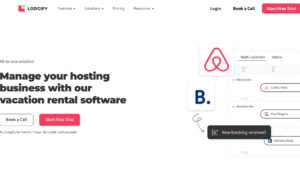In the ever-evolving world of short-term rentals, staying abreast of emerging trends is not just beneficial—it’s essential for success. The industry, characterized by its rapid growth and innovation, is influenced by factors ranging from technological advancements to shifts in consumer behavior and regulatory landscapes.
For those involved in managing Airbnb properties, understanding these trends can provide a strategic edge, ensuring that your offerings not only meet current demands but also anticipate future shifts in the market. This article explores key trends shaping the future of short-term rentals and offers practical advice for integrating these insights into your property management strategy.
Technological Integration: Enhancing Efficiency and Experience
The role of technology in transforming the short-term rental experience cannot be overstated. From streamlined booking processes to smart home features that offer guests unparalleled convenience, technology is at the heart of the modern rental experience. Key technologies to watch include:
- Smart Locks and Self Check-In: Offering guests seamless entry to properties without the need for physical key exchanges.
- Home Automation Systems: Enhancing guest comfort with smart thermostats, lighting, and appliances.
- Virtual Concierge Services: Providing on-demand assistance and local recommendations through AI-powered solutions.
| Technology | Description | Benefits to Guests |
| Smart Locks | Keyless entry systems allowing guests to use a code or a smartphone to enter. | Enhances security and convenience. |
| Home Automation | Systems controlling lighting, temperature, and entertainment through voice commands or apps. | Provides comfort and a personalized experience. |
| Virtual Concierge | AI-powered assistance offering local recommendations and answering guest queries. | Offers 24/7 support and enriches the stay with local insights. |
For property managers, investing in these technologies not only enhances guest satisfaction but also improves operational efficiency. This is where SummerOS, the asset intelligence platform powering a new era of performance-led short-term rental management, comes into play. With tools to win new homes, prove value to owners, and monitor exactly how a listing is performing, SummerOS helps managers move beyond reactive decisions to operating like true revenue leaders.
The Rise of Niche Markets
As the market for short-term rentals becomes increasingly saturated, differentiation is key to standing out. Catering to niche markets offers an opportunity to attract specific segments of travelers looking for unique experiences. Examples of niche markets include:
- Eco-Friendly Lodgings: Properties that emphasize sustainability and eco-conscious living.
- Workation-Friendly Spaces: Rentals equipped with high-speed internet and workspaces for digital nomads.
- Pet-Friendly Properties: Accommodations that welcome guests with pets, complete with pet amenities.
Identifying and targeting niche markets requires understanding your potential guests and tailoring your properties to meet their specific needs and preferences.
Sustainability: A Growing Priority
Sustainability is no longer a buzzword but a fundamental consideration for many travelers. Properties that adopt sustainable practices not only appeal to a growing demographic of eco-conscious guests but also contribute to the long-term health of the planet. Key sustainable practices include:
- Energy Efficiency: Investing in renewable energy sources and energy-efficient appliances.
- Waste Reduction: Implementing recycling programs and reducing single-use plastics.
- Local Engagement: Supporting local communities by promoting local businesses and experiences.
| Practice | Description | Impact |
| Energy Efficiency | Use of LED lighting, energy-efficient appliances, and solar panels. | Reduces carbon footprint and energy costs. |
| Waste Reduction | Implementation of recycling programs and reduction of single-use plastics. | Minimizes waste and promotes environmental sustainability. |
| Water Conservation | Installation of low-flow fixtures and rainwater harvesting systems. | Saves water and decreases utility bills. |
Incorporating these practices into your property management strategy not only enhances your property’s appeal but also aligns your business with broader environmental goals.
Navigating Regulatory Changes
The regulatory environment for short-term rentals is dynamic, with policies evolving to address the impact of rentals on local housing markets and communities. Staying informed about local regulations and engaging with policymakers can help ensure compliance and advocate for fair policies. Effective strategies include:
- Joining local short-term rental associations.
- Participating in community discussions about short-term rental policies.
- Adapting your business model to comply with new regulations.
Conclusion
The future of short-term rentals is shaped by technological advancements, the rise of niche markets, increasing emphasis on sustainability, and evolving regulatory frameworks. For those involved in Airbnb management, embracing these trends and integrating them into your management strategy is crucial for success. By staying informed and adaptable, you can ensure your rentals not only meet current market demands but are also well-positioned to thrive in the future.
Read more from techbullion



































